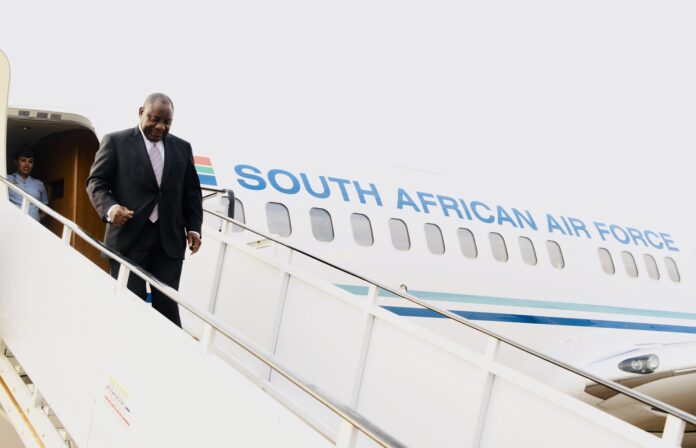By Thobile Jiwulane
The upcoming discussions between South Africa’s President Cyril Ramaphosa and US President Donald Trump are the most anticipated in their relationship’s history.
Ramaphosa expects nothing short of tangible results to entice Trump to change his mind and come to South Africa for the G20 summit later this year. The South African President would like to see Trump realise the foolishness of insisting on the non-existent abuse of privileged whites, one of the reasons relations between the two countries have gone sour.
Indeed, the conflict between South Africa and the US is based on flimsy reasons that only Trump can explain why he has to punish a human rights-respecting country like South Africa, relying solely on clear disinformation manufactured by South Africa’s white right-wing elements to serve their racist interests.
Trump claims to be punishing South Africa because of its “ill-treatment” of Afrikaners, specifically murders, which has been proven wrong even by police crime statistics. This was after a cluster of rightwing groupings and individuals fed false information to the Trump administration that there was a genocide of white Afrikaner farmers whose land was also being expropriated by the state in South Africa. Trump accepted the information without investigating its veracity, promising to investigate it later.
In an apparent abuse of American law, Trump went further to offer the Afrikaners refugee status, although they don’t qualify as refugees because they are not under any political persecution in South Africa. On the contrary, Afrikaners are a privileged white minority who own most of the country’s wealth, including 74% of the land, although they form 7% of the population. This, while the black majority (80%) have only 4% of the country’s land.
As part of the punishment, Trump withdrew aid to South Africa, a move that saw US funding for healthcare being cut off, putting the lives of the disease-stricken at risk, including those suffering from HIV-Aids, Tuberculosis and other illnesses. The withdrawal spread to funding for scientific research sponsored under the US National Institute of Health, affecting university research collaboration between the two countries.
It wouldn’t have come at the wrong time for South Africa, which is beset by massive budgetary constraints. The country’s social services are unable to cope as its budget caters not only to local citizens but also to immigrants, mainly undocumented and illegal border jumpers, from neighbouring countries and beyond.
Also, the country is unable to fix its dilapidated infrastructure—roads, land, and rail networks—and this is worsened by deteriorating mining and manufacturing industries that have multiplied unemployment over the years. South Africa’s unemployment rate hovers around 33%, with youth joblessness in excess of 50%. This is not to mention that the defence budget is almost depleted, having decreased gradually since 1998, making the country vulnerable to any foreign attack.
The two countries need each other—at least this was clear under the Biden Administration, which pursued cordial relations with South Africa. The United States is one of South Africa’s leading trading partners, but not the top one – a position occupied by China and a combined European Union in the second spot, then the US at number 3.
Unlike Trump, Biden ignored all pressure from conservative congress members who demanded that the US cut trade ties with Pretoria as punishment for its close relations with Russia and China. Instead, Biden respected South Africa’s choice of friends and seemed to understand its dilemmas of having to choose the middle ground as a non-aligned country.
During his working visit to see Trump at the White House, scheduled for 19-20 May, Ramaphosa will attempt to iron out the wrinkles in Pretoria-Washington relations. He will have to explain to Trump what South Africa’s neutrality on geopolitical matters, a stance based on its foreign policy that promotes a better world, means.
But Ramaphosa’s most difficult task would be to attempt to convince Trump as to why South Africa took Israel to the International Court of Justice over the ongoing mass killings in Gaza and the subsequent indictment of Prime Minister Benjamin Netanyahu and his former Defence Minister Yoav Gallant by the International Criminal Court. The US supports Israel in the ongoing Middle East war while South Africa sides with Palestine, a historic solidarity relationship going back to the time of Palestinian Liberation Organisation leader, Yasser Arafat, a close friend of South Africa’s freedom fighter, Nelson Mandela.
But Trump is bound to lose if he tries to convince South Africa to change its stance on Israel. The country’s pro-Palestine stance is deep-rooted within the ANC party and would not change through the stroke of a pen. The ANC’s approach was always to side with the oppressed in any conflict. Hence, it always demanded freedom for the people of Palestine via a two-state solution and those of the Western Sahara in Morocco. Mandela was even more vocal about Palestine and Western Sahara than all of his successors – Thabo Mbeki, Jacob Zuma and incumbent Ramaphosa.
The US President would fail to separate South Africa from China and Russia, both of which have liberation ties with the ANC party. Rather, if he wants to keep South Africa closer, Trump should do what Biden did: respect South Africa’s choice of friends. But Trump is not Biden, and he does not reason like him and approaches matters with an open mind.
On the contrary, Trump wants things to go his way and to win the debate, relying on America’s economic strength, which he uses to force weak countries to buckle under his pressure. His bullying strategy has dismally failed in the case of China, which met the US halfway with reciprocal trade tariffs instead of retreating, unlike many, including South Africa, that had to beg Washington for mercy.
Ramaphosa would visit Trump with a mandate to resolve the impasse between the two countries and normalise their relations. He is hoping to achieve this feat. However, Ramaphosa should be cautious not to underestimate that dealing with Trump is like climbing a mountain. This is especially since he has to prove a point that he was correct on Afrikaners and would not like to get embarrassed by being proven wrong about their plight. Also, he would like to demonstrate that he would not compromise on Israel, a very close ally, whose lobby drives the US politics.
Trump’s agreement to attend the G20 Heads of State summit scheduled for November in Johannesburg, South Africa, would prove the success of Ramaphosa’s sojourn. He had previously said he would not participate in the meeting due to the Afrikaner issue and stopped Secretary of State Marco Rubio from showing up for the recent G20 Foreign Ministers’ meeting. The US President reiterated his non-attendance statement during a press conference in the White House on Monday.
He might not have said it publicly, but Trump has a hidden agenda to avoid the US presence in the G20 preliminary discussions, which have been underway since the beginning of the year. The agenda revolves around diversity, equity, and inclusion (DEI) and climate change, issues that Trump has banned under his administration.
However, with or without the US, the G20 continues. Other than the US, South Africa’s Presidency of the current session is supported by the entire world, including the EU, UK, China, Russia, and all of Africa. However, Trump might want to attend merely to accept the crown of being the next President of the G20 for 2026, something he would be glad to do and gloat about. In that sense, Ramaphosa could win in his attempt to bring Trump to Johannesburg in November.


